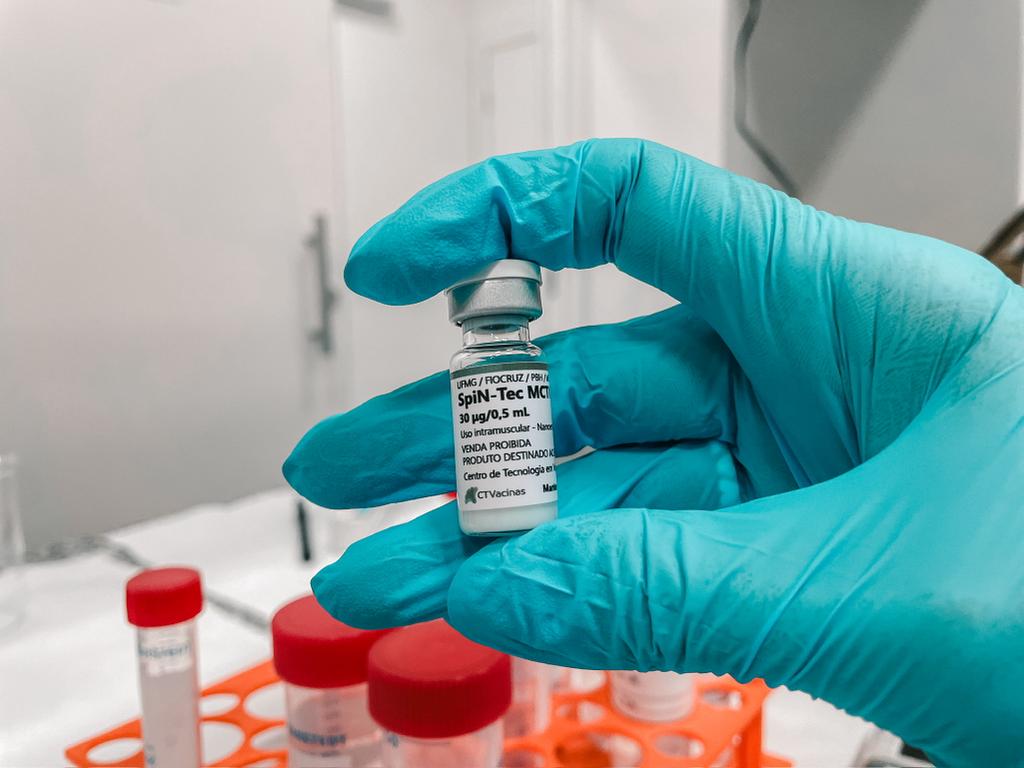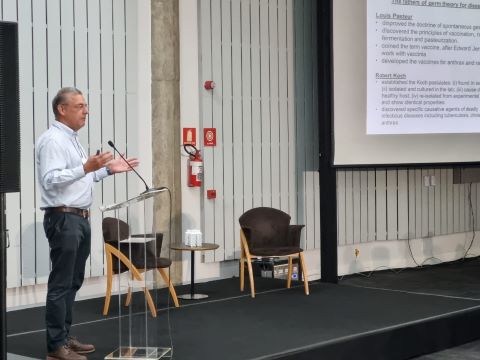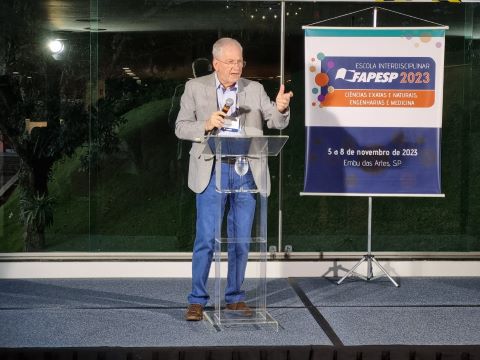


SpiNTec is currently in Phase 2 trials and is being developed entirely in Brazil, with support from FAPESP and other institutions (photo: CTV-UFMG)
Published on 11/21/2023
By Elton Alisson | Agência FAPESP – SpiNTec is a candidate COVID-19 vaccine developed entirely in Brazil. If it succeeds in completing all the requisite development stages and becomes available in the next few years, it could be the ideal choice for vaccination campaigns against the disease, which will be conducted every year starting in 2024, targeting children and other priority groups. The reason is that the Brazilian vaccine, developed with the support of FAPESP and other institutions, is expected to induce a more lasting immune response and should be more effective than the vaccines used hitherto in Brazil against variants of SARS-CoV-2.
This was the view expressed by Ricardo Gazzinelli, head of the Federal University of Minas Gerais’s Vaccine Technology Center (CTV-UFMG), and leader of the team that is developing the vaccine, in a lecture delivered to the FAPESP 2023 Interdisciplinary School in Exact and Natural Sciences, Engineering and Medicine, held on November 5-8 in Embu das Artes, a town in metropolitan São Paulo.
“We’re racing to make sure SpiNTec is offered in Brazil’s vaccination campaigns. It costs nothing to dream,” Gazzinelli told Agência FAPESP.

Ricardo Gazzinelli, head of CTV-UFMG (photo: Elton Alisson/Agência FAPESP)
The protection afforded by the mRNA-based COVID-19 vaccines in current use is not very long-lasting, he said, and they have to be constantly updated owing to the emergence of novel variants, which is a problem for vaccines used in annual campaigns.
To surmount these obstacles, the researchers who are leading the development of SpiNTec have designed the vaccine to activate T-lymphocytes, white blood cells that play a key role in innate immunity. They not only recognize the virus but can trigger a response to various parts of the molecule rather than just the spike protein, as occurs with existing vaccines.
“We’re betting on the possibility of creating a vaccine that’s effective against all variants of the novel coronavirus. We’ve tested it in an experimental model against variants that are circulating in Brazil and found it to afford good protection. We’ll now test the formulation against the latest variant,” Gazzinelli said.
Another advantage of the Brazilian vaccine, and one which will certainly count for much in nationwide vaccination campaigns, is its stability: it can be stored at 4 °C for 12 months and at room temperature for three weeks, facilitating distribution to the remoter parts of the country.
Next steps
SpiNTec is currently undergoing Phase 2 clinical trials. In these trials, which began last month, 350 volunteers receive a dose of the vaccine and are tracked for a year to compare levels of antibodies and T-cells with those of an equal number of participants who receive a booster shot of a vaccine already approved and administered in Brazil.
These trials will make sure the compound does not induce a weaker immune response than the vaccine with which it is being compared. If the results are positive, Phase III trials will be held, involving administration of the candidate vaccine to 5,000 people.
“We’ve already received funding for Phase 3 from FINEP [the Brazilian Innovation Agency, an arm of the federal government],” Gazzinelli said.
One of the challenges of this final stage of testing is establishing an industrial facility in Brazil that complies with best practices in vaccine manufacturing. “We’re looking at one or two companies, and also analyzing the possibility of building a plant to produce the batch of vaccines for use in the Phase 3 trials,” Gazzinelli said.
Besides FINEP, the Ministry for Science, Technology and Innovation (MCTI) and the National Council for Scientific and Technological Development (CNPq) have invested in preclinical, Phase I and Phase 2 trials of the vaccine being developed by CTV-UFMG, which is partnering with Oswald Cruz Foundation in Minas Gerais (Fiocruz Minas).
Funding has also been provided by the Minas Gerais Research Foundation (FAPEMIG) and the City of Belo Horizonte, state capital of Minas Gerais, and a funding measure has been passed by the state assembly.
“SpiNTec will have an important legacy in that our lab is developing other vaccines for neglected diseases such as Chagas. These projects involve immunologists, biochemists, mathematicians and scientists in other fields. I hope to encourage you to join these initiatives,” Gazzinelli told his audience at the School, which consisted of postdoctoral researchers from several parts of Brazil.
Interdisciplinary approach
The Interdisciplinary School in Exact and Natural Sciences, Engineering and Medicine was inspired by FAPESP’s São Paulo Schools of Advanced Science (SPSAS) Program and the Nobel Foundation’s Lindau Nobel Laureate Meetings. Its aims included offering researchers with postdoctoral scholarships and fellowships from all over Brazil an opportunity to find out more about the academic careers and research initiatives of scientific leaders in Brazil and abroad in various knowledge areas.
The organizers received applications to attend from 222 researchers and selected 59, of whom 28 were from São Paulo state and 31 were from 16 other states.
“This event is different from the other schools FAPESP supports and organizes, which focus on highly specific subjects. This School was planned to be multidisciplinary from the outset. It’s the ideal environment in which to promote an exchange of ideas and knowledge. It’s also great for networking. Many of the contacts made here will be for life,” said Marco Antonio Zago, President of FAPESP, who opened the event.

Marco Antonio Zago, President of FAPESP (photo: Elton Alisson/Agência FAPESP)
“This FAPESP School offers a very rare opportunity to explore various knowledge areas. I hope it will be an enriching experience for you. I hope it will help shape your careers and help make them successful,” said Fernando Costa, a professor at the State University of Campinas (UNICAMP) and chair of the scientific committee for the event.
According to Oswaldo Baffa Filho, a professor at the University of São Paulo (USP) and a member of the scientific committee for the event, the School was attended by postdoctoral researchers affiliated with universities and research institutions in all parts of Brazil and a number of other countries.
“I hope this meeting will make an important contribution to the establishment of networks, the breakdown of barriers, and the creation of a new culture in science and society generally,” he said.
Source: https://agencia.fapesp.br/50263